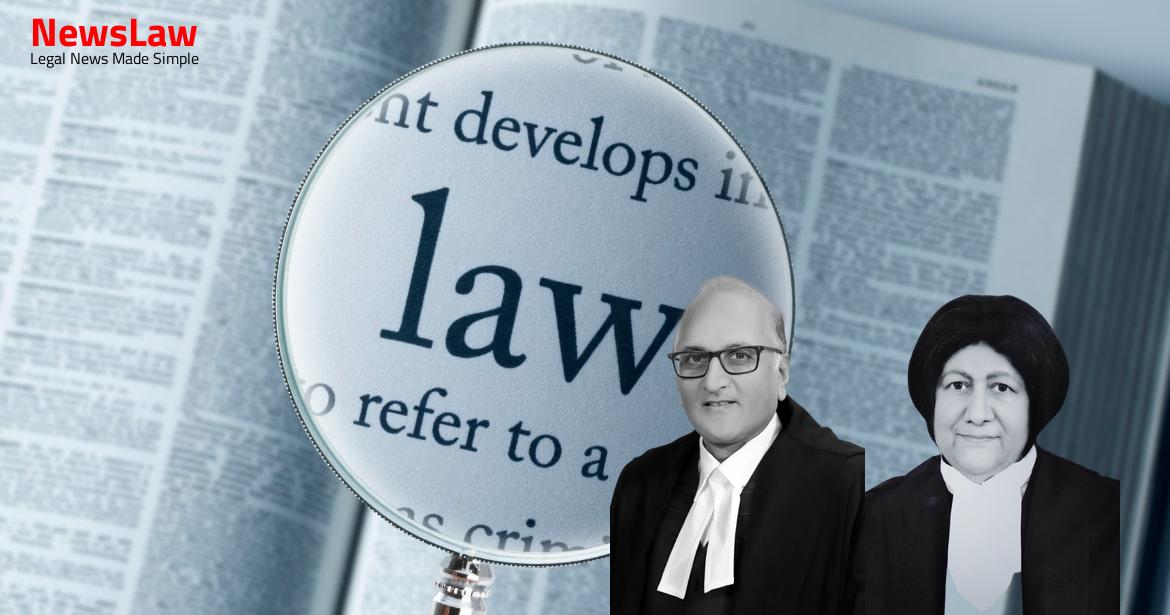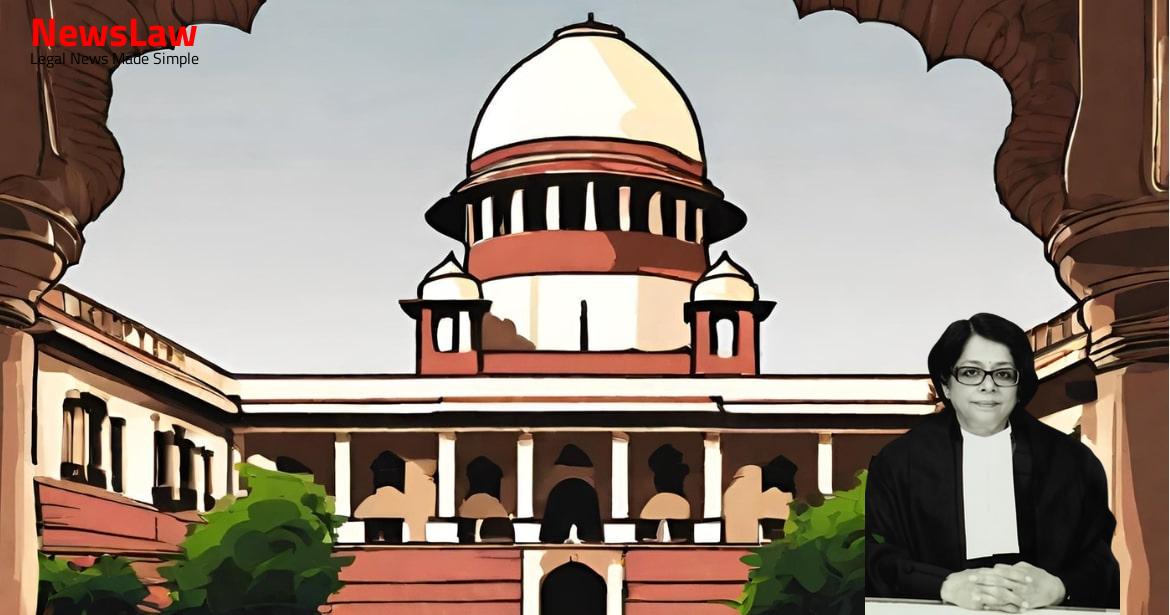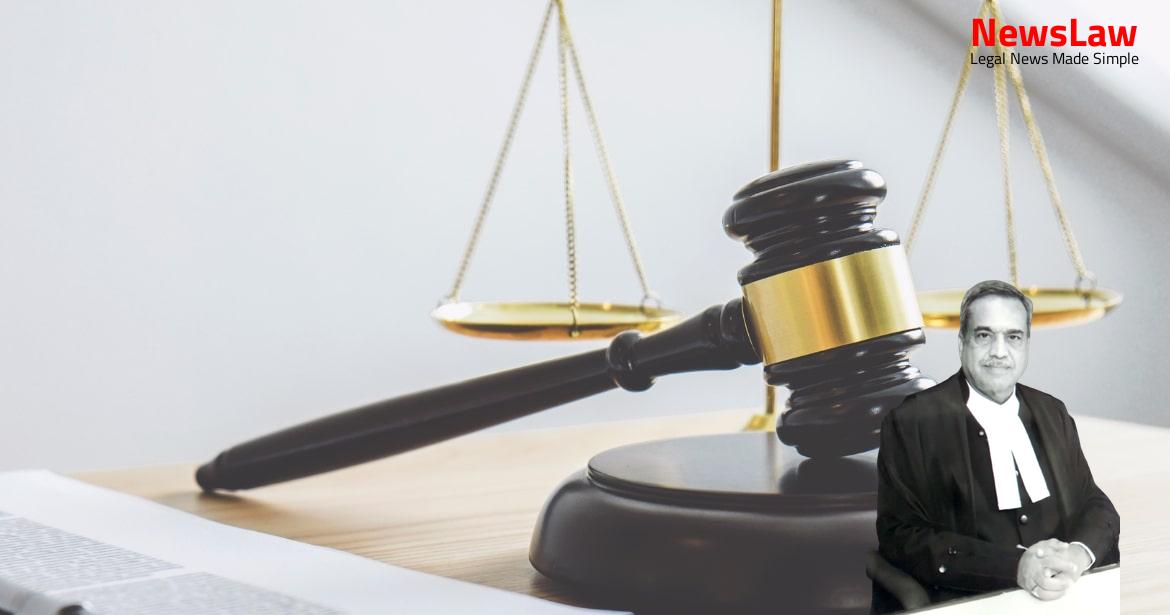Delve into the detailed legal analysis provided by the court in an industrial dispute case, focusing on reinstatement and backwages for the wrongfully terminated employee. The court’s decision reflects a nuanced understanding of labor laws and fair compensation practices in cases of illegal termination. Follow along to learn more about the principles and considerations guiding the judgment.
Facts
- Appellant was appointed as a Watchman in 1992 by the management.
- No seniority list was maintained by the management, leading to unfair termination of the appellant.
- Management contended that the muster roll records were destroyed in a natural calamity except for the years 1994-98.
- Appellant was terminated from service without notice or following the procedures of the Industrial Disputes Act in 2002.
- The appellant’s claim under the Industrial Disputes Act was disputed by the management, citing temporary basis of employment.
- Appellant’s continuous employment since 1992 was acknowledged.
- The Labour Court, in its award dated 31.08.2010, held the appellant’s termination as illegal and directed reinstatement without backwages.
- The Single Judge of the Gujarat High Court endorsed the findings of the Labour Court and directed appellant’s reinstatement, confirming the award.
- The management delayed the reinstatement for a decade, resulting in the denial of backwages in a harsh manner.
- The Division Bench noticed that junior workers were retained while appellant was terminated, and proper records were not maintained by the management.
- All findings were endorsed by the High Court, and the substitution of the reinstatement order was seen as a miscarriage of justice.
- Both the Labour Court and the Single Judge found the appellant’s claim of continuous work to be proven under Section 25B of the Industrial Disputes Act.
- The Labour Court drew adverse inference due to management’s failure to produce all records, concluding the termination as illegal based on available evidence.
- Despite the above, the Division Bench set aside the reinstatement order and instead awarded lump sum compensation of ₹1 lakh.
Also Read: Balancing Power and Transparency: Electoral Bonds Struck Down, Disclosure Mandated
Arguments
- The denial of reinstatement to the appellant was based on the impugned order.
- The order did not disturb the findings of the labour court and the single judge.
- The denial of reinstatement was deemed unfair as it lacked reasoning or norm basis.
- The respondent’s counsel argued against interference with the impugned judgment.
- The Division Bench was supported for correctly applying the law in not upholding reinstatement.
- The workman appellant sought relevant service particulars through the Labour Court.
- The workman had been out of employment for over 20 years.
- Reinstatement was not deemed to be in the interest of justice.
- The employee admitted that workers junior to him were retained in service, in violation of Section 25G of the Industrial Disputes Act.
Also Read: Recall of Resolution Plan Approval: Legal Analysis
Analysis
- The Labour Court and the learned Single Judge thoroughly considered the depositions and evidence on record.
- The appellant workman used the RTI Act to obtain documents supporting his claim of unjust termination.
- Management failed to refute the evidence but claimed inability to produce relevant documents.
- The Division Bench’s substitution of reinstatement with lumpsum payment lacked a known principle basis.
- Employer must prove if the terminated employee was gainfully employed to deny back wages.
- Restoring an employee after illegal termination implies reinstating to the same position as if no dismissal occurred.
- The Division Bench’s judgment did not interfere with factual findings.
- Lengthy legal proceedings deprive the employee and their family of sustenance and opportunities.
- In cases of procedural termination defects for daily-wage workers, reinstatement with back wages is not automatic.
- Monetary compensation is preferred over reinstatement in cases of procedural defects in termination.
- Legal provision allows termination with proper compensation even after reinstatement due to illegal termination.
- Workman should not suffer due to management’s attempt to set aside relief.
- Long litigation processes can be financially and emotionally draining for the employee.
- Substitution of reinstatement with lumpsum payment was deemed unwarranted in this case.
- The judgement was delivered 5 years after the initial award by the Labour Court.
- Workmen on daily-wage basis cannot claim regularisation or right to continue as daily-wage worker.
- Reinstating such workmen after illegal termination may not serve a useful purpose.
- If employer found at fault and workman reinstated, employer must pay deprived wages.
- Workman whose service is illegally terminated is entitled to full back wages, except if gainfully employed elsewhere during the period.
- Reinstatement with full back wages is the normal rule in cases of illegal termination motivated by unfair labor practices.
- In cases of illegal termination of a daily-wage worker, reinstatement should be the rule unless there are weighty reasons against it.
- The court can exercise its discretion in directing reinstatement with backwages when retrenchment is declared illegal.
- Denial of backwages due to delay in judicial process is considered punishing the employee.
- Responsibility lies with the management for choosing to engage in litigation.
- No unreasonable or perverse actions found in the decisions of the Labour Court and single judge.
- Had the management accepted the verdict earlier, the appellant would not have suffered for over 10 years.
Decision
- The appellant is entitled to backwages for a period of two years from 01.01.2020 to 01.01.2022.
- The impugned judgment is set aside.
- The respondent management is directed to pay the backwages at current rates within 6 weeks.
- The appeal is allowed with no order as to costs.
- The direction for continuity of service and reinstatement of the appellant is restored.
Case Title: JEETUBHA KHANSANGJI JADEJA Vs. KUTCHH DISTRICT PANCHAYAT (2022 INSC 1006)
Case Number: C.A. No.-006890-006890 / 2022



